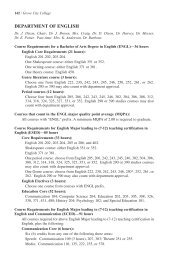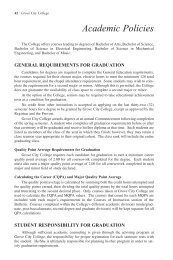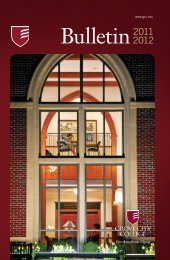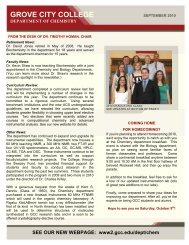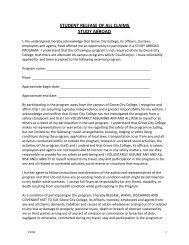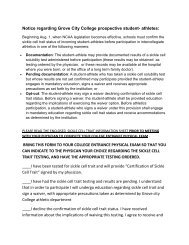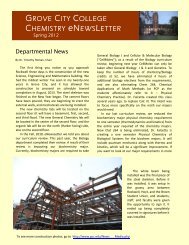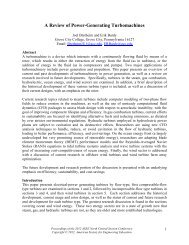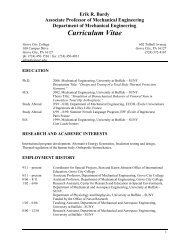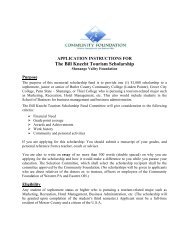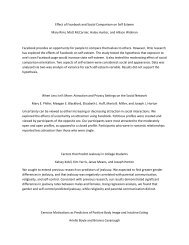2009–2010 - Grove City College
2009–2010 - Grove City College
2009–2010 - Grove City College
You also want an ePaper? Increase the reach of your titles
YUMPU automatically turns print PDFs into web optimized ePapers that Google loves.
Biology / 77<br />
Major-related requirements (35 hours):<br />
Astronomy 206 or 207; Chemistry 101-102; Computer 204; Geology 201;<br />
Mathematics 161; and Science 204.<br />
Economics 204.<br />
Either Psychology 203 or Business 201.<br />
Either Science 201 or Physics 121 (both are recommended but Science 201 may not<br />
follow Physics 121).<br />
Education requirements (38 hours):<br />
Education 103, 201, 202, 203, 303, 305, 309, 371, 431, and 488.<br />
Course Requirements for a minor in Biology (20 hours)<br />
Biology Core (8 hours):<br />
Select one of the following combinations:<br />
Biology 101 and 234 or<br />
Biology 102 and 231.<br />
Biology Electives (12 hours):<br />
Select 12 hours from 300-400-level courses, excluding Biology 260, 270, 360, 370,<br />
372, 375, 376, 390, 460, 470, 475, 476, 480, 497, and 499.<br />
The Biology curriculum seeks to develop academic competency and professional<br />
awareness, to encourage meaningful integration between the biological sciences and other<br />
dimensions of life, and to promote lifelong learning skills in problem solving, research, and<br />
communication. Writing-intensive, speaking-intensive, and information literacy skills are<br />
developed by special assignments in core and seminar courses.<br />
BIOLOGY (BIOL)<br />
BIOL 101. GENERAL BIOLOGY I. An introduction to fundamental biological concepts including<br />
biomolecules, cells, energetics, metabolisms, classical/molecular genetics, and vertebrate systems.<br />
This course partially fulfills the Writing Intensive (WI) and Information Literacy (IL) requirements for<br />
majors in the Department of Biology. Three lectures and one lab per week.<br />
Fall semester only, four hours.<br />
BIOL 102. GENERAL BIOLOGY II. A study of biological concepts with an emphasis on diversity<br />
of life including classification, survey of organisms, animal behavior, population genetics, natural<br />
history, and ecology. Three lectures and one lab per week. Spring semester only, four hours.<br />
BIOL 208. INTRODUCTION TO ENVIRONMENTAL EDUCATION. This course introduces<br />
the scope of environmental education. Topics addressed will include history and current trends, issue<br />
articulation and methodology, and development of problem-solving and communication skills to<br />
address environmental issues. Learning competencies K-12 will be emphasized and reinforced by<br />
environmental project-learning experiences. Spring semester only, two hours.<br />
BIOL 231. GENERAL ECOLOGY. A study of responses of living systems to a changing environment<br />
in relation to selected ecosystems with emphasis on the interrelations of individual, population,<br />
community, and habitat. Three lectures and one lab per week. Prerequisite: Biology 102 or permission.<br />
Fall semester only, four hours.<br />
BIOL 234. CELLULAR AND MOLECULAR BIOLOGY. A focus on the organization and physiology<br />
of living cells using a problem-solving approach to learning with particular emphasis on webbased<br />
resources in biotechnology, genomics, genetic diseases, and immunology. The laboratory provides<br />
core experience with model cellular systems and basic tools of biomolecular research. This<br />
course partially fulfills the Speaking Intensive (SI) and Information Literacy (IL) requirements for<br />
majors in the Department of Biology. Three lectures and one lab per week. Prerequisite: Biology 101<br />
or equivalent. Spring semester only, four hours.



